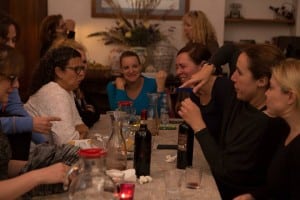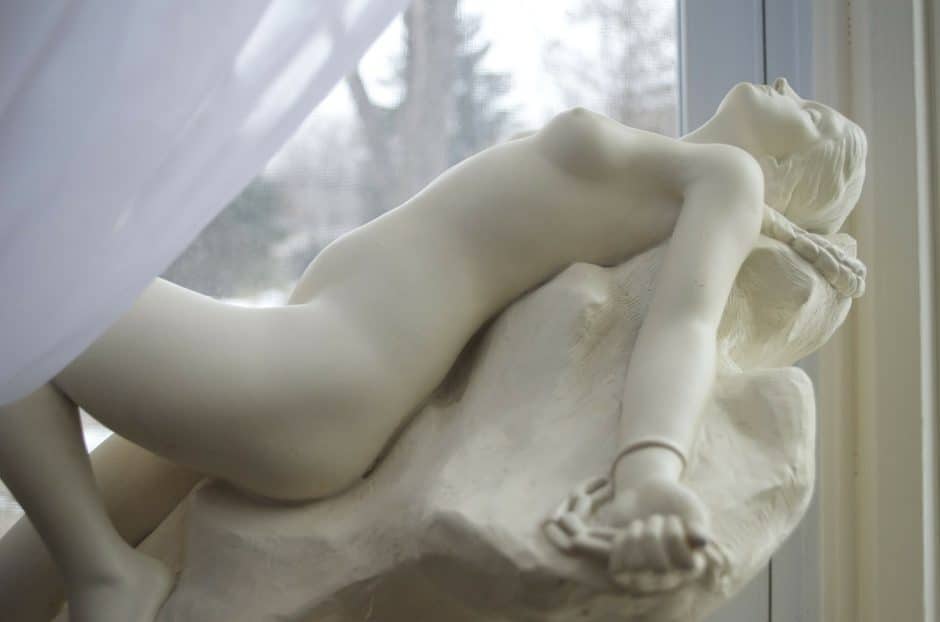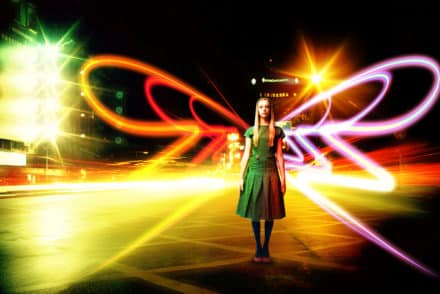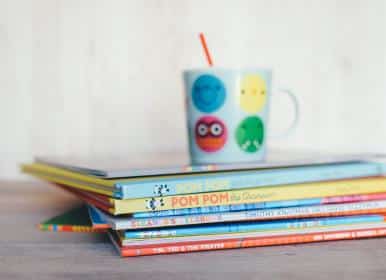Trigger Warning: This essay discusses abuse and rape.
By Claudia Smith
For Meihua, my daughter
When I was small, Jesus was more than love, more than an important figure to me. He was the soul of everything. I could not imagine my world without him any more than I could envision a world without rain, sun, clouds, or earth.
A picture of Jesus hung over my grandmother’s dresser; he wore a cream robe falling in a way that only suggested a body, light shooting from his barbed valentine heart. He was so very beautiful; his hair was light brown, his beard split into a small heart as well. It was difficult to read the expression in his eyes and over the years, I saw many feelings in them. Gentle forgiveness, calm resignation, even lust. If he was in pain, he seemed to have transcended.I preferred this image to the crucifix that hung in church. I can’t say when I began to understand that suffering was his love, or at least the proof that was needed for me to understand the depths of his love.
Years later, when I was no longer Catholic, when I wasn’t sure if I was anything, I still prayed when I was afraid. I would say the Act of Contrition, Hail Mary, and whatever else I could remember, even after my understanding of Jesus had complicated and when asked, would call myself a “lapsed Catholic.” I liked that. It left things open. When I prayed, I imagined the eyes of the Jesus in that classic Sacred Heart picture, not the Jesus nailed to a cross. That image sort of pissed me off. Why should I trust him more because he was tortured? Wasn’t his love infinite? What was the torture for anyway?
Today, I woke to you pulling my arm, “wake up wake up” My back was knots. Six a.m., and I had almost overslept.It is unusual for you to stir at all when I teach an early class; on those days, I’ll dress you when you are sleeping.Your brother and I have a whole system down now. He carries the bags down while I make your lunch. You aren’t an infant anymore, but you still sleep like one, your body heavy, your head tucked easily into my shoulder; I carried your brother this way for years, dressed him this way for school before my early morning classes.
But this morning was different. My back hurt, and when I flinched, you laughed and climbed over me. You didn’t understand, you are only just beginning to comprehend pain.
I took my pills, took an Aleve, woke your brother, took you to school. After I came back, I opened the windows, went to pack my backpack, and then when I lifted the books I fell. It was a tumble, really.A slapstick fall. Pain shot through the base of my neck and I lay down on the cold floor, looked up at the ceiling. I lay there for several minutes, flattening my back against the cold floor.
I felt old. You’ll be four on the last day of May; I am forty-six. There is almost half a century between us. The pain was intermittent, nothing I couldn’t mask with a pill and willpower. But I thought, for a moment, this must be a taste of what it is to be old, and to wake up every morning with pain whistling in and out of your bones.
The thing is, I fear that as I get older pain will be something I must become conditioned to; not like it was for me the first half of my life. Not even a memory exactly. Once, when I was small as you, my father would carry me from the car to my room, through doorways and hallways, and if I woke, in the morning I wasn’t sure if it happened, or if I had dreamed.
Seven years ago when divorce happened (I know the word can be used as a verb, as in “when I divorced your brother’s father,” but when I think of that time I can only think of it as a force, a thing, not something I did or that was done to me) I believed my ex-husband’s dental insurance would cover the removal of my wisdom teeth; it did not. I went to a dental center for referral; not a Castle, but a place like it. The dentist, a white man in his thirties with a nondescript face, gave me a lecture the likes of which I had not had from a stranger in some time. In a voice filled with contempt, he called me stupid, he said I did not take care of my teeth, he called them “riddled.” My wisdoms should have been out years ago. I believe he said, “These people,” meaning me, and my people, whomever they were. The room, I remember, was painted brightly and Christian music was playing. I also distinctly remember that he and I were the only white people in the office. So he was not speaking of race when he said “these people.” He might have meant women who looked like me. I wondered, did he make a habit of scolding his patients? I felt utterly, deeply ashamed.
The dental assistants were kind. They were women, and closer to my age than his. I told one of them, “I’m getting a divorce.” I think she put her hands on my shoulder. I said, “But I’m taking care of it now.”
Later, in the car, I gazed at myself in the rear view mirror, trying to see what he saw. I thought for him I was all teeth, chipped teeth, grinded down molars, yellowed, riddled in the back. I might have fooled some, but how could I fool a dentist? I was someone who could not afford to take care of her teeth, and soon that would show, in other ways, if I didn’t take care of it now.
A few weeks later, a friend drove me to have the bottom wisdoms out; she waited in the SUV with her daughter and your brother as I had the procedure done. I anticipated the pain, welcomed it. I think I felt even a little disappointed it was manageable. The sweet distance, the Vicadin I took for a weekend, the gentle tears streaming down my face when I came to – even the collection agency that sent me letters in bold print for months after, SARMA 750.86 – all of it came to me as a relief. Like a shot, they woke me up, they were bad medicine I needed to swallow quickly. A tolerable pain.
I didn’t remember the procedure, but I do remember again a kind dental assistant. My face was wet, with tears, and she said “It happened to me too.” I wasn’t sure what I had told her, but she walked me out to my friends’ SUV.
I resisted the temptation to thrust my tongue into the clotting blood in my sockets.
You can become addicted to a certain level of pain. Like bad TV, or junk food, there is a comfort in the habit. In a very short period of time, a lot of tasks I had thought I was too fragile for had become surmountable; driving over tall bridges, talking to bill collectors, paying the bills by myself.
Before leaving that city, that house, I scrubbed everything; the baseboards, everything. As I was sweeping in the backroom of our rented house one cold afternoon, I knelt down, amazed at my find. In the midst of all the dust – that house was old – there was a human tooth. Not mine. Not your brother’s. An adult tooth. I picked it up; it was worn. It was a tooth, I thought, that had spent many years inside its person’s head. I am convinced it was a man’s tooth. I wondered if it had fallen out, or was some indication of old violence that had occurred years ago. Your brother insisted there was a sound, one I could never hear, in the backroom and I knew he was afraid and couldn’t understand why. I believed, and didn’t believe, that maybe that old house was haunted. Maybe that was it. The house had pulled something dark and dismal out of us, something festering we had grown accustomed to, the way you can become accustomed to the smell of decay.
The sadness of that time is muffled to me now. I can remember a dull, kind of fluorescent/white noise, the kindness of friends and friendly acquaintances as a kind of elevator music in the background, bringing me back to myself. In my flashes of memory there is your brother’s face, his serious blue eyes, his four-year old pronouncements which seemed so cryptic and philosophical to me at the time. He dreamed that the moon was melting into our home, filling it with silver light. I sang to him, scheduled my crying bouts for after he was asleep.
I was especially aware of this notion when your brother was small, and now, when I watch you, your three year old self, maneuvering her way through your first few years of life. You cry and laugh easily; you cried when you had to say goodbye to your father, when you saw a crushed ladybug, when your brother ate the last Oreo. I know now, because you are not my first child, that there is no way I can keep you from feeling pain. Still, when you are sick, I hold you for hours, I sing to you. You cough and cry, and for now, you can’t understand why I don’t have the power to make it all go away. When I remember loving moments with my own mother, it’s days when I was sick, feverish, suffering from migraines or the flu. Days when she would bring me fizzy coke in a glass bottle and press it to my forehead, and bring me egg-in-the-nest once I could keep things down.
Years ago, your grandmother told me I was “very sensitive.” When I cried, after my father had called me a bitch, a cunt, torn the clothes in my closet, her voice would lilt, turn, “there there” it said. It was gentle but mocking. Poor poor pitiful me, she would sing. Her voice was Novacaine, keeping it at a tolerable level.
At home, I did not submit but when I was out and about in the schoolyard, I followed her instructions. In junior high, when some girls pushed me against a wall and popped the pimple on my chin, I submitted very easily. There were the girls, the strange intimacy of it all, of the one girl so close to me that I could smell her breath. The girl who popped my pimple was following the instructions of a small, blonde, amber-eyed popular girl. “Pop it,” her leader said, and as one girl held my shoulders, the other pressed her nails into my skin skillfully, like a medical technician. I did not struggle. It did not feel personal.
What is it like to live in constant, chronic pain? I do not know. I do know that for years, your grandmother managed my soul-pain. She dimmed the lights. She wrapped my pain, packed it with clean cotton, tended.
I asked myself, when I sat down to write you this letter about pain, what it felt like to be raped. I can’t answer you. I can tell you, it hurts. I can tell you that childbirth hurts. Rape hurts more. But I don’t think this is because the physical pain is more intense. It hurts the soul.
Years ago, when our house was infested with rats your grandmother dealt with it by leaving them poison. It was a shitty time; your grandfather threatened to send me up to collect the trays when he was angry, and I was scared. I stayed in my bedroom listening to Simon and Garfunkel 8 track tapes while your grandmother dealt with the attic rats.
Beside us there was an empty parking lot people had been using as an illegal dump, and when the health department sent trucks to clear it all out, the rats moved next door, to our attic.Your grandmother would take care of it in her own way; she always did. For a long time, there was the sweet stench of rot. After a while we got used to it, and eventually it was gone. But we had grown accustomed long before the rats had desiccated in the attic. Years later, away from home, I made a sound, too. I looked down, after, at my hands, moving. They were mine and they were not mine. They moved, weaving in and out. All my parts. All my parts were working parts.
You are agile; it makes me hopeful. Maybe this disconnect could never happen to you. Your YeYe is a retired actor, a kind of dancer. Maybe you are too. You love to run and jump, and you catch yourself when you are about to fall. Your arms and legs are lean and strong. I watch you lifting your wrist, weaving your hands in the air. “Butterflies!” Maybe that will be a gift, and it will protect you. I don’t want you to ever sever your mind from your body, your body from your pain.
Some weeks before I left home to go to college, your uncle and I climbed into the attic. Our grandfather had died, and our mother had used some of the money left to repair years old damage from Hurricane Alicia. My brother was sad. He said after I left, it wouldn’t be the same. “I’ll come back,” I said. But he knew, when I did not, that this was not a possibility. I stood up, walking. We had not been in the attic in years. “Claudia,” he said. “Stop. Look down.”
Of course, they were still there. Countless rats, mummified, years after infestation. There were what I had imagined, an army of rats, although I had told myself they were not what I had imagined. “Nicholas,” I whispered. He waded through them, and lifted me on his back, and carried me out. This is my first and only memory of your uncle being strong enough to carry me, his big sister.
Your birth, and your brother’s birth, are memories I like to re-visit again and again. I had pre-eclampsia during my pregnancy with your brother. At the time, my marriage was unraveling although I would not see it, would not believe it. I ignored pain as a symptom; instead I saw it as weakness. The doctors would check me in to the hospital when your brother crashed inside me. They hooked me up to a monitor. They took a lot of tests, so many that a few times my blood spurted. I felt an odd sense of calm. The monitor attached in two small circles, the size of small hands, to my belly. I could hear my baby boys’ heartbeat, all the time. I had to lie on my side, and could sit up for ten minutes at a time. There was nothing to do but to wait.
Julia Child had just died, and so I watched marathon Julia Child shows and biopics. One of those nights, I could not sleep, waiting for your brother’s father. There was a rainstorm, one of those Texas sheet lighting storms. A kind nurse brought me extra jello. “I know you are worried,” she told me, “but try not to think about your husband. I don’t think he is coming back tonight. You need your rest.”
And then, later, “It happens more often than you’d think.”
I told myself I would remember her name, and I committed it to memory. I called her by name. But I forgot it as soon as I left that hospital. Even now, I can’t conjure it; she was chubby, light hair, sweet face. I was there for almost a week before the HELP “declared” itself and they induced. This, I remember – a sense of isolation, of fear. I didn’t cry, at least not that I remember. I bit my lip, and I kept apologizing in whispers. I was afraid of my father, I kept telling the nurses not to let him in; at some point, after they told me your grandparents were there, I stopped pushing.
I hate admitting this. It seems the one moment I was not a good mother, the one moment I’ll admit to myself, at least. I felt very content, and the pains that shook me hours before were gone. “You have to push, she stopped pushing…” The doctor there that night wasn’t my own. “You have to push,” they said, not sympathetically, and I did, and your brother was born. They took him away, immediately. I was on magnesium drips, I drifted in and out, waiting. It seemed, at this time, my body was not my own. I woke alone in a very high-tech room, all the machines covered in oak paneling, covering monitors and equipment. There was a rocking chair with a fat cushion, and I remember thinking no woman who needs this room would ever sit in that. When a nurse came, I asked if your brother was okay, and I asked when I could have the catheter removed. I don’t think I really believed in him until a nurse brought him to me.
“Oh,” I think I said, “he is golden.”
He was jaundiced, she explained. He twirled his fingers and then pressed his head against my chest, searching, as if he knew better than I. She held him against me and he nursed.
What happened to me, on that table when I stopped, was that my body forgot, and then my body remembered.
Seven years later, you were born in a hospital down the street from the University of Southern Mississippi. On paper, you would think it would have been a more difficult birth. I was forty-three, living on a stipend and student loans; your father lived in Alabama, on student loans; it was a high risk pregnancy. I had high blood pressure. I had pregnancy-induced diabetes, whatever that’s called. Eventually my feet were so swollen I had to teach in slippers. I had a seven year old to contend with; a sweet, mostly obedient seven year old, but still. I was studying for my comprehensives. Your father would begin his residency in a few months. But it was easy; it is the easiest time I can remember. Your father drove to Hattiesburg every weekend he wasn’t working; he made ribs for us in the slow cooker. At night, you kicked against my ribs, waking me. Spring came, and the little cottage we lived in was crawling with life, with caterpillars, burning azalea, fire ants, mice. Soon after your birth, I knew we would be leaving Hattiesburg. I felt in love with the college town the way you can only love a place you have left, or are leaving. Mostly, I realized, I was not afraid.
You like me to tell you about the day you were born. Your father was there. It took me only a few hours to push you out, and when you came, you cried out immediately. I was not alone with you and a blurry nurse the first time I held you. Everything was joy, the sweet fat doctor who had told us she and her husband were not able to conceive, the nurses who told me how impressive I had been, never crying out or screaming, and you, with a full head of dark hair. You latched on right away. Your father took a picture. Your brother came hours later, and held you, and we all slept together in the hospital room, you in a little mobile plastic bed beside me. “You have a beautiful family,” the night nurse told me. Your father brought me chocolate cake from the cafeteria. In a brief moment alone with me your first day, I saw your brother’s eyes fill. “Are you okay?” I asked him. “I’m just so happy, Mom.”
It was the last day of May, springtime. The hospital room had one large window overlooking a street I could walk to from the little cottage we lived in; I had grown up mostly in the city, and I never really got used to the size of Hattiesburg. It was no quaint place, no tourist town; it was a college town, and people I came to know there, because I was a mother and they were mothers, were from the south, and would never leave it. I was not like them. I would come and go, so many places that it got to where I couldn’t imagine loving a place without knowing I would leave someday. In a few hours, your father would push us out to the car, where he had installed the new car seat. I wouldn’t have to ask.
In that last moment alone with you I carried you to the window, and remembered, then whispered, the lines from a favorite children’s book.
Is the spring coming?” he said. “What is it like?”…
“It is the sun shining on the rain and the rain falling on the sunshine…”
The past didn’t matter right then, and the future, well, I couldn’t imagine. Just the sun, and you.

Claudia Smith has had her work appear in numerous journals and anthologies, including The Rumpus and Norton’s The New Sudden Fiction: Short Short Stories From America and Beyond. She has published two collections of flash fiction, The Sky Is A Well And Other Shorts (Rose Metal Press) and Put Your Head In My Lap (Future Tense Books) as well as a short story collection, Quarry Light (Magic Helicopter Press). Claudia lives in Houston, Texas where she works as a lecturer at The University of Texas Downtown. This essay is part of a collection of letters she is writing to her daughter, Meihua.

Join Jen Pastiloff in Tuscany Sep 17-24, 2016. There are 5 spaces left. This will be her only international retreat in 2016 and is her favorite retreat of the year. Email barbara@jenniferpastiloff.com asap. More info here. Must email first to sign up.





No Comments